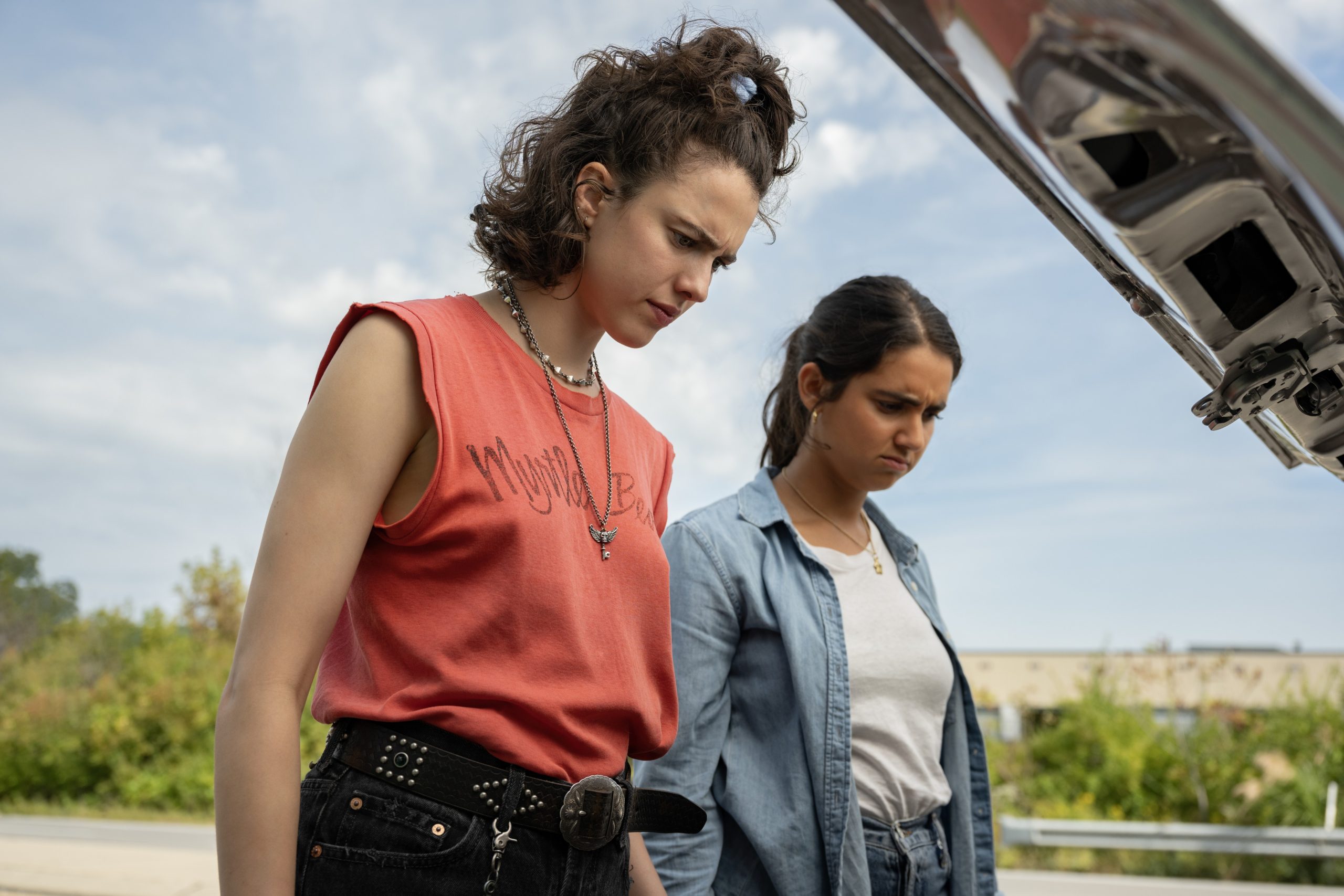There is a very special pleasure in discovering a writer or director is simply cleverer than you are. Instead of harbouring resentment towards them, the correct response is to be curious and feel you’ve been educated in the best possible way. Joel and Ethan Coen are both geniuses. The Minnesotan born brothers genre hop with remarkable skill. From comedy, to crime, westerns, comedy crime, comedy westerns, self-reflexive meta films about being in the entertainment industry, bluegrass Homer, neo-noir… there is little the Coen brothers haven’t tackled. Joel is the “director,” and Ethan the “writer/philosopher.” Recently they have begun working independently from each other with Joel directing a stunning version of Macbeth. Ethan has been working with his wife Tricia Cooke notably on the documentary Jerry Lee Lewis: Trouble in Mind. Drive-Away Dolls is his first solo fictional feature, and it is everything one could hope for – whip smart, side-splitting, rollicking, and witty entertainment.
Initially written in 2000 by Ethan and Tricia and pitched to Allison Anders of Gas Food Lodging fame – Drive-Away Dolls had the much more to the point title: Drive-Away Dykes. Set in 1999 the film is a queer as hell sex comedy, a road trip movie, a crime thriller, and a fairly damning piece on the politics of the era. Absolutely no one is spared. Just as Raising Arizona was a critique of the Reagan era and The Big Lebowski spoke to the George H. W. Bush years: Drive-Away Dolls pokes fun at Republicans and Democrats in the mid to late 90s. It’s bracing, lewd, over the top, politically and erotically charged feminist lesbian empowerment.
Beginning in Philadelphia, The city of Brotherly Love, Coen and Cooke set the tone immediately. Pablo Pascal plays Santos, a “collector” holding on to a Robert Aldrich briefcase (Kiss Me Deadly being a blueprint for many including Alex Cox, David Lynch, and Quentin Tarantino). Santos is violently despatched with kitchen utensils and in corkscrew in an alleyway. Santos ends up as a severed head à la Bring Me the Head of Alfredo Garcia. A rapid pan to a disorienting city spanning shot of the statue of William Penn. The movie then crosses to one of our heroines, Jamie (Margaret Qualley) muff diving with a woman who is definitely not her girlfriend. Jamie accidentally answers a call from her actual girlfriend at an ‘inopportune moment’ due to somewhat crossed wires in a conversations with her best friend, Marian (Geraldine Viswanathan).
Marian is a non-Caucasian Chelsea Clinton coded lesbian who has failed to make it as an intern on the political campaign trail. She’s uptight, lonely, and about to check out of Philadelphia and her dead-end job for a while to go bird watching in Tallahassee with her conservative Aunt Ellis (Connie Jackson). When Jamie is kicked out of her apartment she shared with her cop girlfriend, Sukie Schenkleman (Beanie Feldstein) for her continuous infidelity, she decides that hitting the road with Marian is just the adventure she needs to get over her breakup. Romance is for suckers.
Marian and Jamie end up in a drive away rental office run by Curly (a deadpan and grouchy Bill Camp). They are unaware that their car was allocated to a group of fixers to deliver the briefcase from the opening scene to their employer in Tallahassee. What follows is Coen and Cooke playing gleefully with pulp and exploitation cinema. A pair of seemingly mismatched lesbian protagonists being hunted down by a duo of idiotic, squabbling, henchmen: Arliss (Joey Slotnick) the self-proclaimed people person, and Flint (C.J. Wilson) the hit first ask questions later muscle. Trying to keep some form of control of a quickly spiralling situation is the suavely tailored Henry James reading Chief played by Colman Domingo.
Marian and Jamie get into the shitty Dodge Aries — painted by Jamie to say, “Love is a sleigh ride to hell” and the frantic adventure begins. Freewheeling free-spirited Texan native Jamie is determined that Marian will get laid. Since Marian broke up with her girlfriend after working with her on the Ron Paul campaign, she’s been celibate. Her love life consists of reading Henry James and avoiding being picked up by clueless co-workers. Jamie has more sex than she can handle. Orgasms are her escape from her impecunious reality.
Where Marian is buttoned up, Jamie is rebellion personified. Marian wants a grand romance inspired by tragic literature. Jamie just wants to fuck and drink herself senseless. She’s sex-positive and unapologetic. Nothing she does is malicious – it is just messy. For all her hustling “smarts” she’s quite emotionally intelligent. Jamie might find reading Henry James like “Dragging wet spaghetti across her tits,” and teases Marian mercilessly – but she does actually see her friend and her erotic potential.
The road trip itself is a picaresque for both Marian and Jamie. They are supposed to get the car to Tallahassee within a specific window, but Jamie is all about the great adventure. Most of the time they don’t know what is in the trunk of the car. And when they find the briefcase it comes with the bespectacled head of Santos. Whatever is in the briefcase is creating Acid Trip visuals and there are flashbacks to a series of orgies where someone most certainly did “inhale the marijuana” in college. Tricia Cooke and Ethan Coen throw so many cinematic and cultural references at the viewer it sets the head deliriously spinning.
From fleabag motels as they drive into Republican country to luxury hotels in Tallahassee and slow dancing on the terrace of a fancy restaurant. From dine and dash, junk food, cheap beer, student housing, gas station top ups, and tyre blowouts in places where being nice to the traditionalist police officer is the best course of action, but not doing so, and ending up in jail.
State competition soccer girls have team building exercises which involve lesbian heavy petting games which Jamie (enthusiastically) and Marian (reluctantly) play. They later lead the incompetent goons tracking the pair on a merry chase to off the map juke joints.
Unbeknownst to Marian and Jamie they have accidentally made a very powerful enemy. A Floridian senator with aspirations for the Presidency. Running on the platform of “Family Values” the last thing Senator Gary Channell (Matt Damon) needs is a couple of lesbians opening the suitcase which contains the package. What is in it “belongs to him,” and a group of other powerful men. A foul temptress (Tiffany Plastercaster – Miley Cyrus) seduced him and in his mind castrated him. If there is one thing some straight men don’t want its women having ownership of their package.
The very pissed off Sukie who is a more capable cop than any of the men around her. Sukie wants to get rid of the annoying Chihuahua, Alice B Toklas, she shared with Jamie (“the slut”) and sets Arliss and Finch on her trail. However, she kicks Finch’s arse before doing so, and Alice the chihuahua gets in on humiliating Arliss and Finch too.
Jamie’s impetuous and insubordinate style is anathema to Marian’s fussiness. Marian is all correct grammar, factual information, and repression. Marian’s formative sexual awakening came from spying on her sunbathing neighbour who wore cowboy boots while otherwise naked. The child Marian (Samsara Leela Yett) with her blue painted toenails bounced on a trampoline fascinated by the voluptuous form of the woman over the fence. She created her own spyhole (gloriously phallic imagery) and saw a goddess living with a schlubby husband who just wanted to know when dinner was ready. Young Jamie had to escape Texas because there was no space for a teen lesbian who could seduce the wives and daughters of domineering men. Coen and Cooke want you to know how achingly dull enforced heteronormativity is. Be gay, do accidental and deliberate crime is the tenet they’re working with.
Almost every man is a dud. From Damon’s misogynist man-child senator, through to Bill Camp’s lumpen drive-away manager, Curlie. If a man is at all interesting it’s because he’s an outlier. Colman Domingo’s Chief manages to be menacing because he is impeccably put together. Under the surface of intelligent dispassion is a beast ready to strike. He’s also not going to get mixed up in any of the sloppiness which has trapped his boss. Of course, he doesn’t have the control he believes he does. None of the men in the film do.
Drive-Away Dolls is good clean dirty fun. A world which starts with a man losing his head and ends up with it rolling to a stop at the feet of a statue of Ponce de León. A world where an irate Beanie Feldstein is a short Jewish Pam Grier or Angie Dickinson. Where a rainbow credit card is somehow magic (Jamie pulls out the gay card more than once). Wall mounted dildos get thrown in Jamie’s cardboard box of personal items and her experience with light bondage gets her out of a scrape. Dykes on motorbikes, Pennsylvania nightclub lesbians, and rural ‘butter-churn barn’ gays. Jamie’s milkshakes, dead shot carnival game accuracy, and soft quilted concern for Jamie. The flashback psychedelia is dreamily freaky and steamy: Anton LeVay Horned Gods, Lizard Kings, Angela Davis Panthers, Foxy Browns, and High Priestess bacchanalia.
Everything coalesces to create the figurative and actual “ride of your life.” Carter Burwell’s score. Ari Wegner’s always brilliant and exemplary cinematography. Yong Ok Lee’s end of the millennia production design mixed with roadside Americana. Tricia Cooke’s canny editing. Margaret Qualley’s angelic face next to Geraldine Viswanathan’s blossoming countenance. The superb diegetic music which includes Le Tigre (‘Eau D’Bedroom Dancing’), Funkadelic (‘Maggot Brain’), and Linda Ronstadt (whose gorgeous seventies album covers are almost a character). Plus, Diana Krall’s jazz interpretations playing at a swanky restaurant, and Lizzy Mercier Descloux’s French no-wave hit ‘Fire’.
Tricia Cooke identifies as queer. There is little doubt that her long gestating project with her husband has gone through some changes over the years; but Drive-Away Dolls never gives up on its balance of sincere chaos. There are lesbian and gay icons scattered everywhere in the film – it is no coincidence that the closeted Henry James is the author de choix. Creating a sugar and spice anarchic Russ Meyer meets Doris Wishman meets John Waters meets Pedro Almodóvar meets… well… Ethan and Joel Coen, in thirty-five days is astounding. Also, clocking in at a mere 83 minutes the audience feels the high BPM tempo, but nothing seems rushed. There is no dead end for Jamie and Marian and their road to romance for twenty-first-century lesbians. They’re here! They’re Queer! Get used to it!
Vive la Dolls and giddy up. Drive-Away Dolls proves that a good woman is not hard to find if you look in the right place, and hypocritical mediocre privileged men don’t always win. It’s kismet.
Director: Ethan Coen
Cast: Margaret Qualley, Geraldine Viswanathan, Beanie Feldstein
Writers: Ethan Coen, Tricia Cooke



